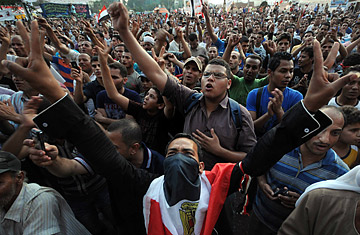
Egyptian protesters chant slogans in Cairo's Tahrir Square on July 13
(2 of 2)
On Tuesday the Supreme Council of the Armed Forces held a press conference, it seemed, to reaffirm just that. "We will not let go of the role of the administrative voice in the country now," said Major General Mamdouh Shahine. The military will continue to oversee Egypt's political transition until elections have taken place and a constitution has been drafted. It reserves the right to use force and military courts to deal with "thugs" — a loosely defined term. Last week, the council reinstated the Ministry of Information, which runs the state-affiliated press, despite having disbanded it earlier this year. In short, the military leadership reserved the right to decide almost everything because, as Shahine put it, "We're putting the benefits of everyone above personal interests."
The protesters demur. Despite pledges of transparency in the upcoming election process, for instance, the Supreme Council of the Armed Forces remains largely opaque: five months into its rule, no one has any idea how many members the council has, or of their identities.
Most of the ex-regime's officials who have close ties to the military also appear to have escaped the uprising's aftermath unscathed. The brunt of the judicial backlash has landed instead on the corrupt businessmen and party officials who were notoriously at odds with the military since well before Mubarak's fall. One Egyptian colonel told TIME this week that he remembers a meeting he attended in the U.S. last year between Egyptian military officers and their counterparts in the Obama Administration. The Americans were obsessed with the prospect of a Gamal Mubarak presidency, he recalls. He and his fellow officers shook their heads confidently: "All Egyptians hate Gamal," and many have said that included the military.
Indeed, Mubarak's sons may yet be handed the largest chunk of the blame for the regime's crimes. Together with the ex-President, their trial is set for Aug. 3. But Mubarak has not yet landed in jail, and instead remains in a military hospital because of poor health. Then again, no media organization or activist group has been allowed near the hospital.
"We have no clue — when they say he's under guard — what that means," says Joshua Stacher, a political scientist and Egypt expert at Kent State University. "When it comes to these military personnel, they're largely off limits," he says. "Really the only people that are being sacrificed are lesser generals from competing institutions like the Interior Ministry, and civilian politicians."
Omar Suleiman — for years Mubarak's right-hand man, chief enforcer and, briefly, the U.S.-backed alternative when it became clear the President would have to stand down — is one of the former officials most conspicuously absent from the list of those facing prosecution. Little is known about Suleiman's power behind the scenes as Mubarak's intelligence chief — a role in which he conducted a shadowy war on extremist groups and allegedly oversaw torture — or of the role he played after he was appointed Vice President during the uprising. Civil suits filed against Suleiman following Mubarak's ouster, as reported by local press, mysteriously disappeared after they were handed to military courts. The Supreme Council of the Armed Forces told TIME last month it has no record of such cases.
In the chaotic disagreement over how to proceed — and perhaps realizing that the military may be too tough an adversary — some protesters have turned their anger toward Sharaf. On Tuesday, the Revolutionary Youth Coalition, an assortment of young political activists, called for Sharaf's ouster, saying that he had lost the credibility to lead Egypt's democratic transition.
But in Tahrir Square, as usual, there is little accord. "It's not about Essam Sharaf," said Mohamed Ibrahim, a medical student who was camped in the square on Tuesday night. "Essam Sharaf is a good person ... [Some activists] want him to go because they think he hasn't done anything. But that is not a crime. No matter how strong a man is, he can't do anything in the face of the armed forces."
